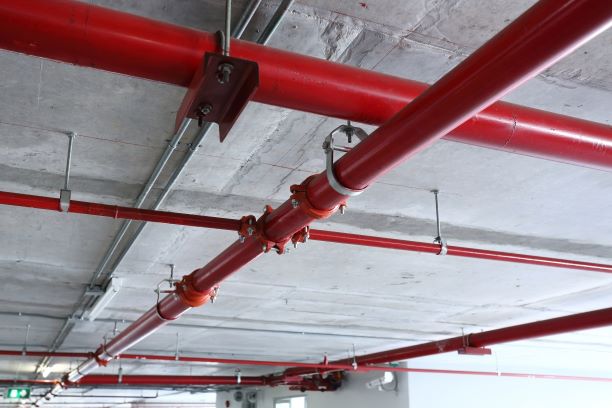
While it’s always important to inspect and test your fire protection systems, preparing fire sprinkler systems for winter will keep your fire safety equipment in working order during the winter months. Fire sprinkler systems are an important component of fire protection that can prevent enormous and costly damages. Additionally, sprinkler systems protect employees or residents of commercial buildings by extinguishing fires early.
As temperatures drop during the winter months, your fire sprinkler system can potentially become useless if the pipes that deliver the water to the detected fire are frozen. Additionally, a frozen pipe may burst and lead to water damage, even if there is no fire detected in your building. Properly winterizing your fire sprinkler system can prevent freezing and bursting pipes. Continue reading to learn more about the consequences of frozen fire sprinkler system pipes and the importance of preparing fire sprinkler systems for winter with some cold weather preventative maintenance.
What temperatures and conditions cause fire sprinkler systems to freeze?
- Wet sprinkler systems hold water in the pipes. The National Fire Protection Association (NFPA) standard 25 stipulate that wet sprinkler systems be maintained at a minimum of 40 degrees Fahrenheit. It is also recommended that wet systems not be exposed to freezing temperatures, which can happen when insulation is disrupted when pipes exit then re-enter the building, or where there is a lack of building heat.
- Dry sprinkler systems are those that keep pressurized air inside the pipes instead of water, so they can withstand freezing temperatures. However, careful maintenance is needed to keep these pipes from freezing if they are exposed to sub-32-degree temperatures. In addition, the source pump, where the water is kept pressurized, needs to be in a room that is above 40 degrees.
Areas with the highest freeze potential include:
- Fire sprinkler control rooms
- Mechanical rooms
- Isolated rooms
- Unoccupied rooms
How can you prevent fire sprinkler systems from freezing?
The most effective way of keeping your fire sprinkler system from freezing is to provide regular year-long maintenance. You should contact a professional fire protection company like Summit Fire Protection to discuss how you can prevent pipe freezing through regular fire sprinkler system maintenance. As a property owner, you are responsible for keeping the temperature of your building at the appropriate temperature, especially if you have a wet fire sprinkler system.
To keep buildings safe from fire during the winter months and avoid costly repairs down the road, there are preventative maintenance steps you can take:
- Monitor your local weather and know when temperatures are expected to drop below freezing.
- Maintain adequate heat in all buildings during the winter months. Back-up heating options are important if there is an electrical power outage. If all areas can’t be kept at least 40 degrees, you need to insulate your pipes.
- Provide sufficient insulation.
- If you have a dry pipe system, you should visually inspect and drain your pipes every few days at low points which can collect moisture and condensation
- Contact Summit Fire Protection to conduct regular inspection, testing, and maintenance of the sprinkler systems.
I live in a warm climate – do I need to winterize my system?
Summit Fire Protection recommends checking your fire sprinkler system before the onset of winter, even if your location experiences mild winters. In fact, buildings in warmer climates can be more vulnerable to freezing because insulating measures are ignored. Without inspecting your system, it can be difficult to properly prepare for the onset of cold weather and be aware of whether or not your system is ready. Even one cold snap can bring a system to the breaking point if it has not been properly winterized.
Summit Fire Protection can help winterize your fire sprinkler systems
Your fire sprinkler system should be inspected annually. At an annual inspection, a qualified professional will take steps to prevent your fire sprinkler system pipes from freezing with routine maintenance.
- If you have an antifreeze system, a skilled technician will test samples from your fire sprinkler system to make sure the water in your pipes has the correct concentration of antifreeze. This concentration is important and prevents the freezing and bursting of pipes.
- If you have a dry system, a professional will drain the fire sprinkler system and then flush it with water to make sure it is operating properly and there are no cracks or leaks. Once the pipes are dry, the technician will seal the pipes and pressurize them with air.
Contact Summit Fire Protection today to have a highly qualified fire sprinkler system technician inspect and test the sprinkler at your facility.

